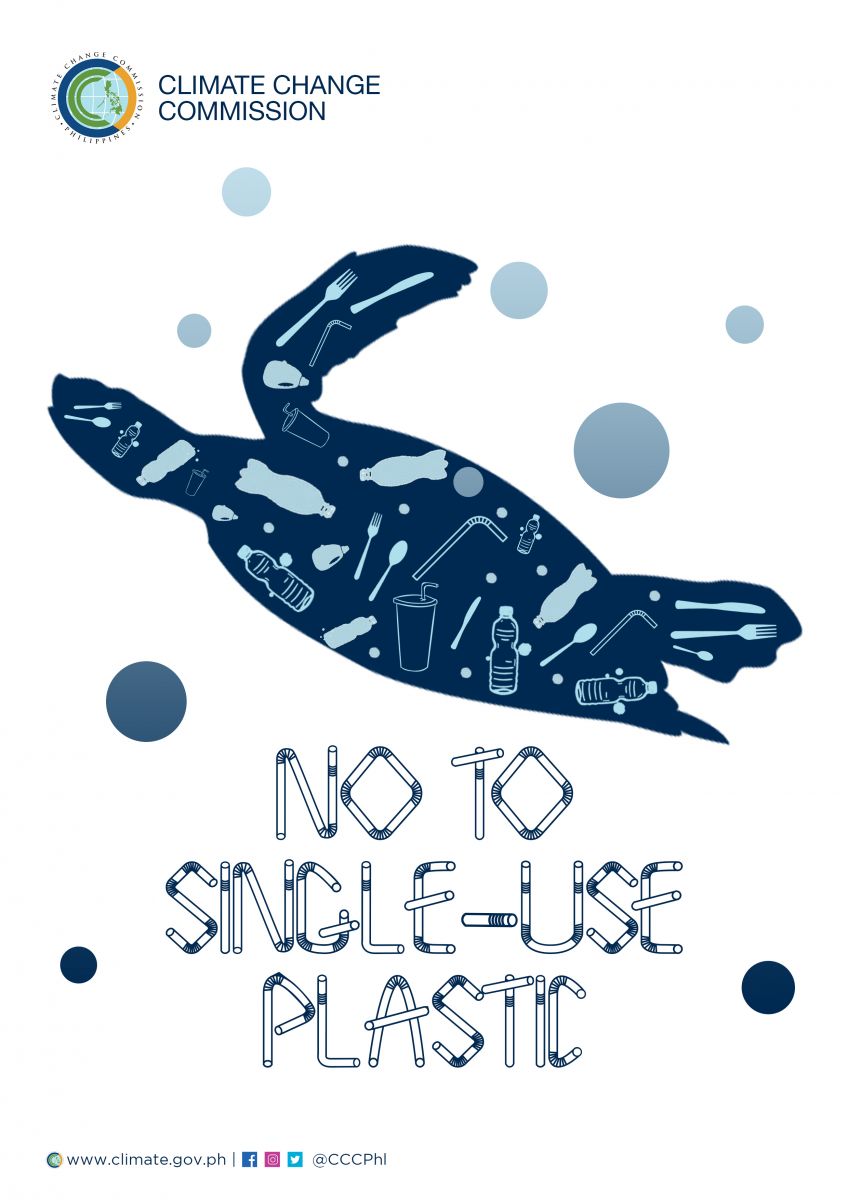
January 14, 2021 Thursday

The Climate Change Commission imposed a plastic ban in its office operations through Office Order No. 2020-010 entitled Office Waste Management System dated 24 January 2020. Disposable plastics, such as plastic straws, stirrers, utensils, food wrappers, grocery bags, instant food packaging, lids, drinking bottles and caps are prohibited within the CCC-CCO premises during the conduct of official meetings, conferences, and other activities.
MANILA, 15 January 2021 — During the 72nd Management Association of the Philippines (MAP) Inaugural Meeting 2021 and Induction of 2021 MAP Board of Governors, Finance Secretary and Chairperson-designate of the Climate Change Commission Carlos G. Dominguez said that the CCC will be pushing for a nationwide ban on single-use plastics.
“While we are pursuing more sustainable practices during this pandemic, why not push ourselves even further by addressing our perennial problem on plastic pollution? Plastic waste clogs our waterways resulting in massive flooding. It kills marine life and threatens biodiversity, as well as causes global warming from the burning of fossil fuels to produce and transport these plastics. This will create more problems in the future, entailing more public costs and resources from us, if we don’t address this problem now,” Dominguez explained.
For the CCC, single-use plastics such as sachets, thin shopping bags, and plastic "labo" bags, are a waste, public health, and climate change problem.
The report “Plastic Exposed: How Waste Assessments and Brand Audits (WABA) are Helping Philippines Cities Fight Plastic Pollution” by the Global Alliance for Incinerator Alternatives (GAIA) found that Filipinos use around 59.7 billion pieces of sachets yearly. The report also stated that Filipinos use 20.6 billion pieces of shopping bags and 16.5 pieces of "labo" bags a year, approximately eight million tons of which end up in the ocean, impacting ecosystems and killing millions of sea birds, sea mammals, and fish.
The climate body views plastic pollution as a serious climate-related concern, with the production and distribution of single-use plastics linked to fossil fuel extraction and transport, and contributing to the world’s increasing greenhouse gas levels. The improper and inadequate disposal and management of single-use plastics also pollutes the environment and disrupts ecosystems, resulting in significant biodiversity loss.
The World Economic Forum (WEF) has highlighted the need for governments to ensure that waste management systems are well supported to deal with current and future plastic waste, especially with the significant increase in plastic pollution from home deliveries and medical waste due to the COVID-19 pandemic.
Chairperson Dominguez also noted that many local government units have already issued ordinances to regulate or ban single-use plastics, and government agencies have adopted national policies to support this, such as the National Solid Waste Management Commission Resolution No. 1363 directing the ban on unnecessary single-use plastics in national and local government agencies and units, and the CCC Resolution on Adopting a Circular Economy.
The DOF and CCC fully support legislative measures for a phase out of single-use plastics and for extended producer’s responsibility that will cover large-scale collection, sorting, and recycling or reusing of plastics. In the Senate, proponents include Senate Committee on Environment, Natural Resources, and Climate Change Chair Cynthia Villar; and Senators Sonny Angara, Nancy Binay, Manny Pacquiao, Lito Lapid, Risa Hontiveros, and Francis Pangilinan; while in the House of Representatives, Speaker Lord Allan Jay Velasco, Deputy Speaker Loren Legarda, and Committee on Ecology Chair Glona Labadlabad, have each filed their versions on banning single-use plastics and extended producer’s responsibility along with many other representatives, so that there are at least 38 bills pending.
Dominguez urged top corporations, many of which are producers and retailers of plastic-based products, to take the lead in the private sector for the anti-single use plastics initiative and not wait for incentives from the government.
“Corporations have the means and the responsibility to design a system where their products do not pollute our lands and seas and aggravate our problems on public health and climate change. They should not wait for any incentives from the government if it’s for the greater good and welfare of all Filipinos,” Dominguez concluded.